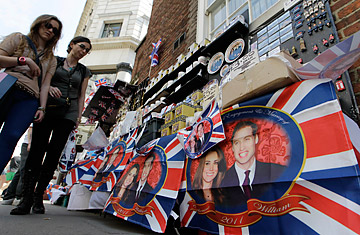
Royal-wedding souvenirs line a street stall in London, the city where Prince William and Kate Middleton will marry on Friday
(2 of 2)
So far, the only audible grumbling about the royal wedding outside the republican community has come not from constitutional scholars and politicians but from British businesses. Annual public support for the royal household — which amounts to $66 million each year in subsidies, and as much as $300 million if unpaid taxes and security costs are taken into account — is a long-running source of controversy in the U.K. Royalists say the palace recoups this money by drawing tourists to the country. Republicans counter that no firm data supports that assertion. Indeed, of the top 20 tourist attractions in the U.K., only one royal residence makes the list: Windsor Castle at No. 17, which is beaten comfortably by the nearby Legoland Windsor, which is ranked seventh.
The wedding will not be a cheap affair. The service will be paid for privately by the families of the groom and bride, but the cost of policing the event — which has been estimated between $8 million and $33 million — will come from public coffers. That's a relatively small figure — equivalent to the salary of some top soccer players — but it's nonetheless come under criticism in some of the British media. More significantly, the wedding day itself has been designated a national holiday. The Confederation of British Industry (CBI) has complained that shutting down the British economy for the day will result in around $10 billion in lost productivity. As the wedding falls close to Easter, consultancy firm RSM Tenon places the entire cost of the country's April holidays at $50 billion, or roughly one-third of the budget for the nation's National Health Service, a significant figure at a time when the country is struggling to recover from financial and economic crises. "This is a fragile time for the economy and we are concerned about the effect this lost productivity will have on our recovery," CBI spokeswoman Sarah Lee says.
This isn't the first royal wedding in Britain to take place during a period of recovery, however, and some commentators say the ceremony will provide a much needed boost to social capital and national solidarity. When Princess Elizabeth married Philip Mountbatten two years after the end of World War II, Winston Churchill called the wedding a "flash of color on the hard road we have to travel." That sentiment has been reflected in Britain's mass-market tabloids, whose daily coverage has fawned over every detail of William and Kate's prenuptial movements and plans. Few stories ever sold more papers in Britain than the life and death of William's mother, Princess Diana, and Britain's press is loath to miss a similar bonanza around William. The BBC plans to assign 200 to 300 journalists to the story, U.S. networks will run prime-time specials, and a variety of foreign broadcast-news channels will carry the event live. "Huge news stories come in many forms," says Helen Boaden, the BBC's director of news. "You have earthquakes, financial crashes and the like, but you also have moments when a nation comes together, and this is one of those moments."
Steven Barnett, a professor of communications at the University of Westminster, isn't so sure. He says the British media are giving the wedding greater attention than it deserves. "It is quite an inexpensive story to cover: it's picture-heavy and can be reported from the office without travel. So it's been an easy story to play big, especially for the papers," he says. But that's not to say that the relentless coverage in the lead-up to the event won't manufacture interest among Brits, and manage to bind the nation to a common — and appealing — narrative. Weddings are ceremonies at once common and momentous in everyday life, and so are occasions when royalty and laity might naturally converge. That Britain's royal family has a history of messy divorces only makes the fairy tale of the handsome prince and his doting bride more compelling to the public, Boaden says. "A lot of weddings start as a fairy tale and end badly. It's a moment in anyone's life when hopes are highest. Almost everyone can relate to that, even if they know it doesn't always work out," she says.
